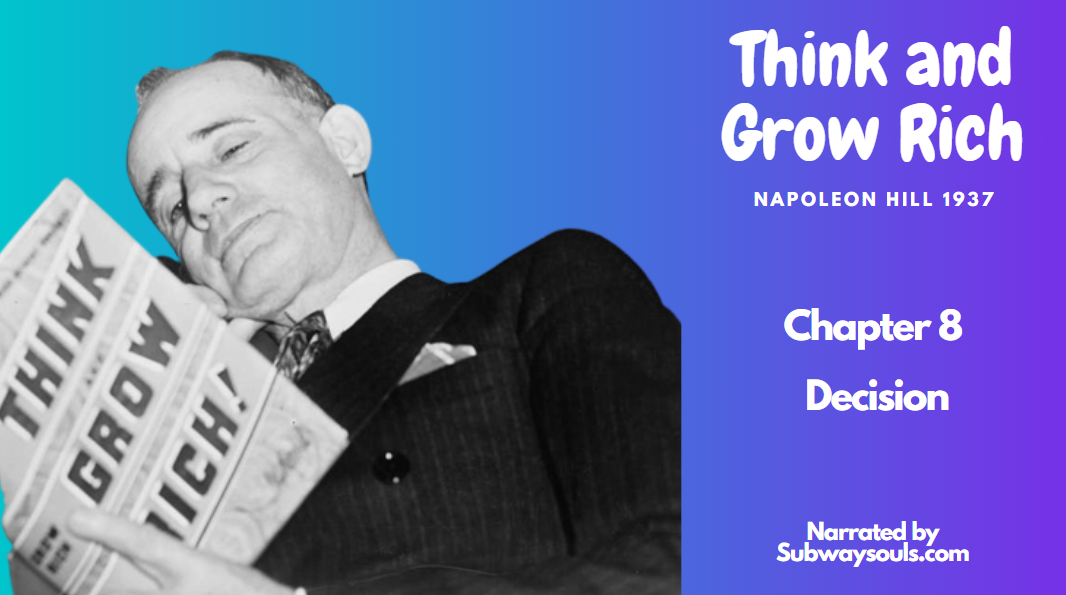Chapter 8 of “Think and Grow Rich” by Napoleon Hill is titled “Decision: The Mastery of Procrastination.” This chapter delves into the power of decision-making and the detrimental effects of procrastination on achieving success. Here is a summary of the key points covered in this chapter:
1. The importance of decision-making: Hill asserts that decision-making is a critical factor in achieving success. Making firm, definite decisions is a key characteristic of successful individuals, as it sets them apart from those who are indecisive or hesitant.
2. Procrastination and its consequences: Hill emphasizes the detrimental effects of procrastination on achieving goals. Indecision and procrastination lead to missed opportunities, delays, and a lack of progress. It hinders success and prevents individuals from taking the necessary actions to move forward.
3. The fear of making wrong decisions: Hill addresses the fear of making wrong decisions, which often paralyses individuals. He emphasizes that indecision is worse than making the wrong decision because it results in inaction and stagnation. Making decisions, even if they are not always perfect, is crucial for progress.
4. The power of analysis and research: Hill advises the importance of gathering information and conducting thorough analysis before making decisions. While quick decisions can be valuable in certain situations, careful consideration and research provide a solid foundation for informed choices.
5. The role of persistence in decision-making: Hill stresses the importance of persistence once a decision has been made. The ability to stay committed to decisions and persevere through challenges and obstacles is crucial for achieving success.
6. Surrounding oneself with advisors: Hill encourages the practice of seeking advice and counsel from trusted individuals when making important decisions. Engaging with a mastermind alliance or seeking the expertise of knowledgeable individuals can provide valuable insights and perspectives.
7. Overcoming doubt and fear: Hill highlights the need to overcome doubt and fear in decision-making. Developing self-confidence, trusting one’s intuition, and cultivating a positive mindset are essential for making confident decisions.
Avoiding over-analysis and indecision: Hill warns against over-analysing decisions and falling into the trap of indecision. While careful consideration is important, excessive analysis can lead to paralysis and missed opportunities. Setting a deadline for decision-making can help prevent procrastination.
8. The power of persistence and adjustment: Hill emphasizes that decisions should be made with determination and persistence. However, if a decision is proven to be ineffective or circumstances change, it is important to be flexible and willing to adjust plans accordingly.
In summary, Chapter 8 of “Think and Grow Rich” highlights the significance of decision-making in achieving success. It underscores the negative consequences of procrastination and indecision, and the importance of overcoming fear and doubt. The chapter emphasizes the power of analysis, seeking advice, and persistence in decision-making. Making firm decisions and taking action is crucial for progress, even if adjustments need to be made along the way.
NB: The above is one chapter from the book “Think and Grow Rich” written by Napoleon Hill and first published in 1937.
It is considered one of the most influential self-help books ever written and has sold millions of copies worldwide. The book aims to inspire readers to achieve success in their personal and professional lives by adopting a mindset of wealth and abundance.
The central theme of “Think and Grow Rich” is that success begins with one’s thoughts and beliefs. Napoleon Hill presents a philosophy of success based on the idea that our thoughts can directly influence our actions and ultimately shape our reality. He argues that by developing a burning desire for a specific goal and aligning one’s thoughts, beliefs, and actions with that desire, individuals can overcome challenges and achieve extraordinary success.
Throughout the book, Napoleon Hill shares principles and strategies for achieving success. These include:
1. The power of thought: Hill emphasizes the importance of maintaining a positive mental attitude, visualizing success, and having a clear and definite purpose.
2. Goal setting: He encourages readers to set specific, measurable, achievable, relevant, and time-bound goals (often referred to as SMART goals) and to create a detailed plan for their attainment.
3. Persistence: Hill emphasizes the need for persistence in the face of challenges, setbacks, and failures. He suggests that persistence is a key trait shared by successful individuals.
4. Mastermind groups: Hill emphasizes the importance of surrounding oneself with like-minded individuals who share similar goals and aspirations. He believes that collaborating and exchanging ideas with such a group can lead to greater success.
5. The subconscious mind: Hill explores the power of the subconscious mind and suggests techniques for programming it to support success. He introduces the concept of autosuggestion, which involves repeating positive affirmations and beliefs to reprogram the subconscious mind.
6. The importance of action: Hill emphasizes the need to take consistent and decisive action towards one’s goals. He argues that thoughts alone are not enough; they must be accompanied by action.
“Think and Grow Rich” also features numerous anecdotes and success stories from notable figures such as Thomas Edison, Henry Ford, Andrew Carnegie, and many others. These stories serve to illustrate the principles discussed in the book and provide inspiration and motivation for readers.
Overall, “Think and Grow Rich” presents a philosophy of success that focuses on the power of thoughts, beliefs, and actions. It provides practical strategies and principles that individuals can apply to achieve their goals and attain wealth, not just in terms of money but also in terms of personal fulfilment and happiness.

